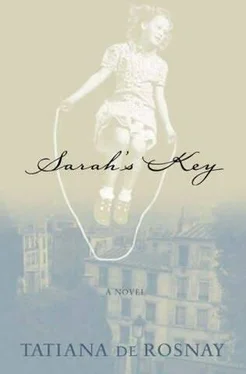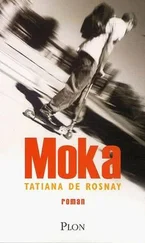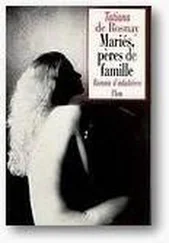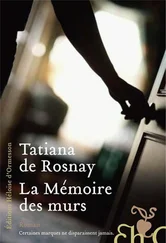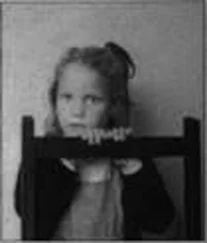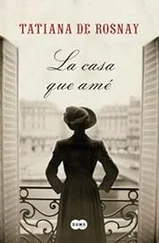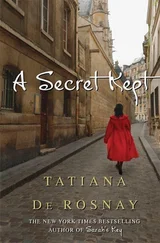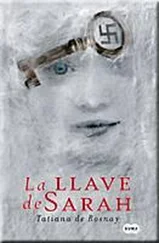I watched her carefully and cleared my throat.
“Mamé, do you remember if this was the beginning of July? Or the end?”
She smiled, pleased to be doing so well.
“I remember perfectly. It was the end of July.”
“And do you remember why the place was vacated so suddenly?”
Another beaming smile.
“Of course. There had been a big roundup. People were arrested, you know. There were lots of places that were suddenly vacant.”
I stared at her. Her eyes gazed back at mine. They clouded over when she saw the expression on my face.
“But how did it happen? How did you move in?”
She fussed with her sleeves, working her mouth.
“Madame Royer told our concierge that an empty three-roomed apartment was free on the rue de Saintonge. That’s how it happened. That’s all.”
Silence. She stopped moving her hands and folded them in her lap.
“But Mamé,” I whispered, “didn’t you think these people might ever come back?”
Her face had sobered, and there was something tight, painful, about her lips.
“We knew nothing,” she said finally. “Nothing at all.”
And she looked down at her hands and did not speak again.

THIS WAS THE WORST night. The worst night ever, for all of the children and for her, thought the girl. The sheds had been entirely looted. Nothing was left, no clothes, no blankets, nothing. Eiderdowns had been ripped in two, white feathers covering the ground like fake snow.
Children crying, children screaming, children hiccuping with terror. The little ones could not understand, kept moaning for their mothers. They wet their clothes, rolled on the ground, shrieked with despair. The older ones, like her, sat on the dirty floor, their heads in their hands.
No one looked at them. No one took care of them. They were rarely fed. They were so hungry, they nibbled dry grass, bits of straw. No one comforted them. The girl wondered: These policemen… didn’t they have families, too? Didn’t they have children? Children they went home to? How could they treat children this way? Were they told to do so, or did they act this way naturally? Were they in fact machines, not human beings? She looked closely at them. They seemed of flesh and bone. They were men. She couldn’t understand.
The next day, the girl noticed a handful of people watching them through the barbed wire. Women, with packages and food. They were trying to push the food through the fences. But the policemen ordered them to leave. Nobody came to look at them again.
The girl felt like she had become someone else. Someone hard, and rude, and wild. Sometimes she fought with the older children, the ones who tried to grab the old stale bread she had found. She swore at them. She hit them. She felt dangerous, savage.
At first, she had not looked at the smaller children. They reminded her too much of her brother. But now, she felt she had to help them. They were vulnerable, small. So pathetic. So dirty. A lot of them had diarrhea. Their clothes were caked with shit. There was no one to wash them, no one to feed them.
Little by little, she came to know their names, their ages, but some of them were so small they could hardly answer her. They were thankful for a warm voice, for a smile, a kiss, and they followed her around the camp, dozens of them, trailing after her like bedraggled sparrows.
She would tell them the stories she used to tell her brother, before his bedtime. At night, lying on the lice-infested straw, where rats made rustling noises, she would whisper the stories, making them even longer than they usually were. The older children gathered around, too. Some of them pretended not to listen, but she knew they did.
There was an eleven-year-old girl, a tall black-haired creature called Rachel, who often looked at her with a touch of contempt. But night after night, she listened to the stories, creeping closer to the girl, so that she wouldn’t miss one word. And once, when most of the little children were at last asleep, she spoke to the girl.
She said in a deep, hoarse voice, “We should leave. We should escape.”
The girl shook her head.
“There is no way out. The police have guns. We can’t escape.”
Rachel shrugged her bony shoulders.
“I am going to escape.”
“What about your mother? She will be waiting for you in the other camp, like mine.”
Rachel smiled.
“You believed all that? You believed what they said?”
The girl hated Rachel’s knowing smile.
“No,” she said firmly. “I didn’t believe them. I don’t believe anything anymore.”
“Neither do I,” said Rachel. “I saw what they did. They didn’t even write down the little children’s names properly. They tied on those small tags that got mixed up when most of the children took them off again. They don’t care. They lied to all of us. To us and to our mothers.”
And to the girl’s surprise, Rachel reached out and took her hand. She held it tight, the way Armelle used to. Then she got to her feet and disappeared.
The next morning, they were woken very early. The policemen came into the barracks, pushing at them with their truncheons. The smaller children, hardly awake, started to scream. The girl tried to calm the ones nearest to her, but they were terrified. They were led into a shed. The girl held two toddlers by the hand. She saw a policeman holding an instrument in his hand. It had a strange shape. She didn’t know what it was. The toddlers gasped with fear, backed away. They were slapped and kicked by the policemen, then dragged toward the man with the instrument. The girl watched, horrified. Then she understood. Their hair was being shaved off. All the children were to be shaved.
She looked on as Rachel’s thick black hair fell to the floor. Her naked skull was white and pointed, like an egg. Rachel gazed at the men with hatred and contempt. She spat on their shoes. One of the gendarmes knocked her aside brutally.
The little ones were frantic. They had to be held down by two or three men. When it was her turn, the girl did not struggle. She bent her head. She felt the cold pressure of the machine and closed her eyes, unable to bear the sight of the long, golden strands falling to her feet. Her hair. Her beautiful hair that everyone admired. She felt sobs welling up in her throat but she forced herself not to cry. Never cry in front of these men. Never cry. Ever. It’s only hair. Hair will grow back.
It was nearly over. She opened her eyes again. The policeman holding her had fat pink hands. She looked up at him while the other man shaved off the last locks.
It was the red-haired, friendly policeman from her neighborhood. The one her mother used to chat with. The one who always had a wink for her on her way to school. The one she had waved to the day of the roundup, the one who had looked away. He was too close now to look away.
She held his gaze, not glancing down once. His eyes were a strange, yellowish color, like gold. His face was red with embarrassment, and she thought she felt him tremble. She said nothing, staring at him with all the contempt she could muster.
He could only look back at her, motionless. The girl smiled, a bitter smile for a child of ten, and brushed off his heavy hands.

I LEFT THE NURSING HOME in a sort of daze. I was due at the office, where Bamber was waiting for me, but I found myself heading back to the rue de Saintonge. There were so many questions going around my head that I felt swamped. Was Mamé telling the truth or had she gotten mixed up, confused, due to her illness? Had there really been a Jewish family living here? How could the Tézacs have moved in and not known anything, as Mamé had stated?
Читать дальше
